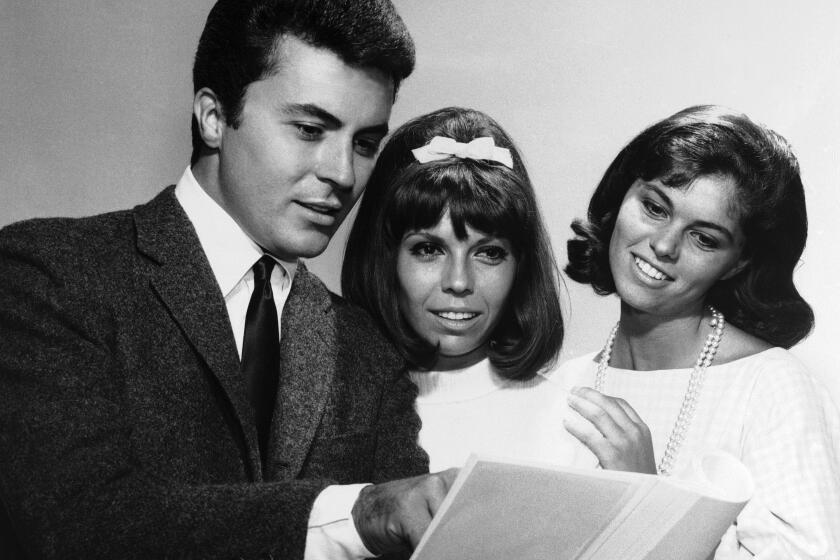Rockin’ and railin’ in Canada, circa 1970
For five glorious days in the summer of 1970, a customized train rocked its way across Canada’s heartland, delivering its talented passengers -- an all-star lineup of musicians -- to daylong mega-concerts in Toronto, Winnipeg and Calgary. As fondly captured in the new documentary “Festival Express,” the train hauled the Grateful Dead, the Band, Janis Joplin and dozens of other musicians as they jammed and partied ‘round the clock, stopping only to perform, occasionally sleep and make a special layover in Saskatoon to restock the alcohol.
Camera crews followed the entire adventure -- the concerts, the all-aboard jam sessions, and the tussles between promoters and politicians, fans and police -- but a feud between the tour’s organizers and filmmakers left the project’s cinematic record a shambles. The footage found its way to the far corners of Canada, including Ottawa, where a right-thinking young man named Bob O’Farrell deposited what reels he could gather at the Canadian National Archives for safekeeping. They remained there, mostly forgotten, for nearly a quarter of a century.
Ten years ago, Garth Douglas, a music fan and documentary filmmaker intrigued by stories he had heard about a “Canadian Woodstock,” along with a friend, James Cullingham, tracked down the archived footage and began a decade-long process of putting together “Festival Express.”
Directed by Bob Smeaton, the film combines the original footage with contemporary interviews, creating a delicious pop time capsule full of small moments and grand rock ‘n’ roll gestures. The narrative follows the same easy rhythms of the tour, beginning with a prelude setting up its unusual circumstances, followed by the three concerts separated by the train ride across western Ontario into Manitoba, through Saskatchewan and into Alberta.
The filmmakers, in consultation with original cinematographer Peter Biziou (who earned an Oscar for the 1988 film “Mississippi Burning”), wisely chose not to update the look of the movie. Instead, it basks in a warm, distinctly period glow, rendered slightly grainy by the blow-up from 16 to 35 millimeter.
Using a split-screen effect, Smeaton contrasts the contemporary interviews with the historical footage, sometimes having a subject speak beside an image of his or her 34-years-younger self. The all-access feel of the scenes on the train are like a privileged peak at the backstage antics of future Rock and Roll Hall of Famers.
The sloppy, booze-fueled jams as the train buzzes the rails only heighten the sense that the film has captured a once-in-a-lifetime happening. The sheer joy expressed by the musicians, both in the earlier footage and in the new interviews, point to the uniqueness of the event.
Joplin is mesmerizing in her performances, wailing through her songs with an urgency that sets an incredibly high standard for those such as Pink and Renee Zellweger -- each set to play Janis in dueling biopics -- who dare to emulate her. Equally stirring are the Band’s churning, harmonic convergence on “The Weight” and their wrenching version of Bob Dylan’s “I Shall Be Released.”
The Grateful Dead, led by the cherubic, hirsute and impossibly young Jerry Garcia, draw much of the film’s focus. Surviving members, including Bob Weir, Phil Lesh and Mickey Hart, are featured in the updated interviews, and the band’s members get more screen time than the other artists. Much of the rest of the live footage is devoted to the other acts on the bill, such as Buddy Guy, the Flying Burrito Brothers, Ian & Sylvia & the Great Speckled Bird and, unlikeliest of all, Sha Na Na, offering a taste of what it might have felt like to attend one of the shows.
This is a joyous film, a celebration of a particular time in pop culture, made more poignant by all the talent no longer with us -- though based on the alcohol consumed, it’s almost more amazing that so many are still around to tell the tale. There were greater rock festivals and there are greater rock movies, but nothing existed quite like this mobile bacchanal, nicely preserved in “Festival Express.”
*
‘Festival Express’
MPAA rating: R for some language
Times guidelines: Drug references, alcohol abuse and a clash between police and some would-be concertgoers.
A Think Film release. Director Bob Smeaton. Producers Gavin Poolman, John Trapman. Executive producers Ann Carli, Garth Douglas, Willem Poolman. Cinematographer Peter Biziou. Editor Eammon Power. Running time: 1 hour, 30 minutes.
Exclusively at Landmark’s Nuart Theater, 11272 Santa Monica Blvd., West Los Angeles; (310) 281-8223.
More to Read
Only good movies
Get the Indie Focus newsletter, Mark Olsen's weekly guide to the world of cinema.
You may occasionally receive promotional content from the Los Angeles Times.











